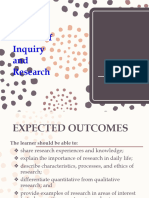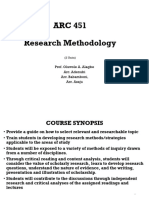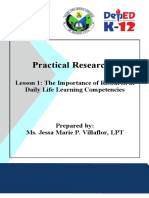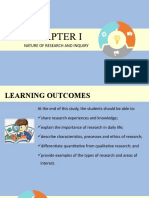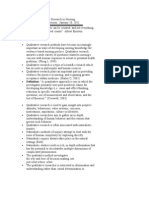Notes in PR1 PDF
Notes in PR1 PDF
Uploaded by
Veron Dela CruzCopyright:
Available Formats
Notes in PR1 PDF
Notes in PR1 PDF
Uploaded by
Veron Dela CruzOriginal Title
Copyright
Available Formats
Share this document
Did you find this document useful?
Is this content inappropriate?
Copyright:
Available Formats
Notes in PR1 PDF
Notes in PR1 PDF
Uploaded by
Veron Dela CruzCopyright:
Available Formats
Research is a systematic investigation for information. It is a process of inquiring.
Nature of Inquiry
• It is a learning process that motivates you to obtain knowledge or information about people, things,
places or events.
• It is exploratory.
• It is multiple, varied, and open to selection.
• Different Factors involved in Different Kinds of Inquiries:
• Selection of appropriate questions
• Formulation of appropriate questions
• Identification of key issues
• Search for valid and relevant evidence
• Interpretation and assessment of evidence
• Application of evidence to identified issues
• Presentation of coherent conclusion, final or tentative
• Reflection on, and assessment of the learning process.
What is Research?
• Research holds the following significant data:
✓ to gather necessary information
✓ to make changes
✓ to improve the standard of living
✓ for a safer life
✓ to know the truth
✓ to explore our history
✓ to understand arts
Why do Research?
➢ The writing process will make you confident in your ability to find information and present it effectively
in varied ways.
➢ You can get to investigate topics that may be of interest to you.
➢ It can make you study more meaningful and you’ll discover real world application of what you’re
studying.
➢ You can have hands-on, practical experience in your field of study.
➢ It is a great way to network and meet new people.
The Role of Research
• Research leads an expansion of knowledge and discoveries. Research effects have led to breakthrough.
• Research is a systematic process of collecting and analyzing data or information in order to increase
understanding of a phenomenon.
• Research is important in providing a solid foundation for the:
✓ Discovery and creation of knowledge, theory-building.
✓ Testing, confirmation, revision, and refutation of knowledge as theory.
✓ Advance a discipline or field.
✓ Advancements and improvements in various aspects of life.
✓ Promotion and tenure of individuals.
• Significance of Research
1. To gather necessary information.
2. To improve standard of living.
3. To have a safer life.
4. To know the truth.
5. To explore our history.
6. To understand arts.
Research and Society
The results/findings of studies also affect society and the lives of each one of us. Research is very vital to
our everyday decision-making. The research you do and evidence you gather will be useful for future
endeavor.
Research and Other Fields/Areas
Research benefits can be seen and felt in the following fields:
➢ Economy
➢ Society
➢ Environment
➢ Culture
➢ Health
Meaning and Characteristics of Research
Research is defined as the scientific investigation of phenomena which includes collection,
presentation, analysis, and interpretation of facts that lines an individual’s speculation with reality.
Characteristics of Research
✓ Empirical
✓ Logical
✓ Cyclical
✓ Analytical
✓ Critical
✓ Methodical
✓ Replicability
The Research Process
1. Define Research Problem
2. Review the literature
3. Formulate hypothesis
4. Design Research
5. Collect Data
6. Analyze Data
7. Interpret and Report
The Basic Research Processes
1. Identify the question or problem
2. Review the Existing literature
3. Clarify the Problem
4. Clearly define terms and concepts
5. Define the population
6. Select Methods of Data Collection
7. Develop the Instrumentation Plan
8. Collect Data
9. Analyze Data
10. Write your Paper
11. Cite your sources properly
12. Conclude your research
13. Proofread
14. Share Results
Factors to Consider in Selecting a Research Problem
❖ Researcher’s area of interest
❖ Availability of Funds
❖ Investigator’s ability and training
Ethics in Research
Ethics generally is considered to deal with beliefs about what is right or wrong, proper or improper,
good or bad. According to a dictionary definition (Webster’s 1968), to be ethical is to conform to accepted
professional practice.
◦ Ethical Considerations in Conducting Research
❑ Objectivity and integrity
❑ Respect of the research subjects’ right to privacy and dignity and protection of subjects from personal
harm
❑ Presentation of research findings
❑ Misuse of research role
❑ Acknowledgement of research collaboration and assistance
❑ Distortions of findings by sponsor
❑ Openness
❑ Responsible Mentoring
❑ Social responsibility
❑ Competence
❑ Legality
❑ Animal Care
❑ Human Subjects Protection
Unethical Practices in Conducting Research
❑ Deceiving a respondent about the true purpose of a study
❑ Asking a respondent questions that cause him or her extreme embarrassment; guilt emotional turmoil
by remaining him or her of an unpleasant experience
❑ Invading the privacy of a respondent
❑ Studying the respondents’ or research subjects without their knowledge
❑ When analyzing the data – revealing only part of the facts, presenting facts out of context, falsifying
findings or offering misleading presentation such as lying with statistics.
You might also like
- Practical Research Week 1-2Document12 pagesPractical Research Week 1-2Shairalyn LeighNo ratings yet
- Research Experience and KnowledgeDocument28 pagesResearch Experience and KnowledgeMackenzie Villeza100% (1)
- PowerPoint Module 1 Nature of Inquiry Andresearch 2023Document53 pagesPowerPoint Module 1 Nature of Inquiry Andresearch 2023Precious May D.C. De GuzmanNo ratings yet
- MC Elt 8 and MC ResDocument19 pagesMC Elt 8 and MC ResJhari May PalmaNo ratings yet
- Business Research Methodology: Chapter - 1Document20 pagesBusiness Research Methodology: Chapter - 1sopner jalanaNo ratings yet
- PRACTICAL-RESEARCH (Lecture)Document7 pagesPRACTICAL-RESEARCH (Lecture)Danielle CondesNo ratings yet
- Practical Reserach 1 Lessons 1 5Document61 pagesPractical Reserach 1 Lessons 1 5joshuamagluyan1No ratings yet
- Chapter 1Document61 pagesChapter 1Ellah Jean BalidioNo ratings yet
- Practical Research 1Document41 pagesPractical Research 1Rynan SarabiaNo ratings yet
- Lesson1-Research Experience and KnowledgeDocument24 pagesLesson1-Research Experience and KnowledgeKassandra Kay100% (10)
- 1st 2 WeeksDocument6 pages1st 2 Weeksyaji FerellaNo ratings yet
- Handouts 3is PDFDocument4 pagesHandouts 3is PDFDe-Andrie GotuatoNo ratings yet
- Research Lesson 1Document15 pagesResearch Lesson 1Jan Den Saul DalanNo ratings yet
- Nature and Inquiry of ResearchDocument29 pagesNature and Inquiry of ResearchJulieSanchezErsandoNo ratings yet
- 3 The Charactersitics Processes and Ethics of ResearchDocument51 pages3 The Charactersitics Processes and Ethics of ResearchCedrick AvellanNo ratings yet
- Lesson 1&2-Importance or Research Lesson 1Document29 pagesLesson 1&2-Importance or Research Lesson 1Cel AycoNo ratings yet
- Research Concept Meaning-ImportanceDocument25 pagesResearch Concept Meaning-ImportanceDody awad MusaNo ratings yet
- Research in Daily Life 1Document40 pagesResearch in Daily Life 1Pierre Joseph HareNo ratings yet
- Is A Systematic Way To Find Out Facts and Knowledge. There Are Two Types of Research, One Is by Method and Other Is by PurposeDocument3 pagesIs A Systematic Way To Find Out Facts and Knowledge. There Are Two Types of Research, One Is by Method and Other Is by PurposeCyrel jay Bautista MoronNo ratings yet
- Week 1 Module in Practical Research 1Document18 pagesWeek 1 Module in Practical Research 1lilighhhNo ratings yet
- RIDLDocument9 pagesRIDLnalaunankaiNo ratings yet
- Practical Research 1: Nature, Characteristics, Strengths, Weaknesses, and Ethics of ResearchDocument6 pagesPractical Research 1: Nature, Characteristics, Strengths, Weaknesses, and Ethics of ResearchPriscaly Ann CastilloNo ratings yet
- PRACTICAL RESEARCH 1 FinalDocument115 pagesPRACTICAL RESEARCH 1 FinalMark Steven Del RosarioNo ratings yet
- RESEARCH-Nature Types ProcessesEthics-ReviewDocument34 pagesRESEARCH-Nature Types ProcessesEthics-ReviewCERVERO MORGAN THIRDNo ratings yet
- Pre Test WK 1 PR1Document24 pagesPre Test WK 1 PR1Barbara Manuel CacheroNo ratings yet
- CHAPTER 1 - Nature of Inquiry and ResearchDocument35 pagesCHAPTER 1 - Nature of Inquiry and ResearchVanessa Tamayo, Ph. D100% (1)
- ARC451-Research MethodologyDocument152 pagesARC451-Research MethodologyToyyib AmusaNo ratings yet
- Characteristics and Importance of ResearchDocument7 pagesCharacteristics and Importance of ResearchSandhya ChoudharyNo ratings yet
- Practical Research 1 Module1Document6 pagesPractical Research 1 Module1Leah IgartaNo ratings yet
- Unit-1 BRMDocument58 pagesUnit-1 BRMshashank reddyNo ratings yet
- What Is Research - CharacDocument27 pagesWhat Is Research - CharacJia CabreraNo ratings yet
- Research Chapter 1Document21 pagesResearch Chapter 1hintsa weresNo ratings yet
- Definition of ResearchDocument21 pagesDefinition of ResearchKendrick JosonNo ratings yet
- Nature of Inquiry Research ReviewerDocument3 pagesNature of Inquiry Research ReviewerAngelene Madrazo 黄贞文No ratings yet
- Inbound 5965767583516944078Document70 pagesInbound 5965767583516944078Shannah Jane LumandasNo ratings yet
- Qualitative Research DesignsDocument34 pagesQualitative Research DesignsCaramae BuckysanNo ratings yet
- ResearchDocument41 pagesResearchawais khanNo ratings yet
- Chap 1Document39 pagesChap 1Amanuel mergiaNo ratings yet
- Research MethodologyDocument85 pagesResearch Methodologysushma.guptaNo ratings yet
- Module 1Document4 pagesModule 1Florens Genoves BagatNo ratings yet
- Module 1-Nature of Inquiry & ResearchDocument11 pagesModule 1-Nature of Inquiry & ResearchAngela Cuevas DimaanoNo ratings yet
- Week 001 - 003 Presentation - Nature of InquiryDocument16 pagesWeek 001 - 003 Presentation - Nature of InquiryJoana MarieNo ratings yet
- The Nature of Inquiry and ResearchDocument33 pagesThe Nature of Inquiry and ResearchJuliet HipolitoNo ratings yet
- Introduction of ResearchDocument63 pagesIntroduction of ResearchHamid HusainNo ratings yet
- Lec 01-Research MethodologyDocument46 pagesLec 01-Research MethodologyfarsunNo ratings yet
- Lesson 6Document21 pagesLesson 6Paula Nykol MojicaNo ratings yet
- MODULE in Practical ResearchDocument9 pagesMODULE in Practical Researchjessa marie villaflorNo ratings yet
- Nature of Inquiry and ResearchDocument21 pagesNature of Inquiry and ResearchShayrah InsiangNo ratings yet
- Research Methodology 3Document26 pagesResearch Methodology 3BEFIKADU TIRFENo ratings yet
- Unit 1 Part 1 - The Nature and Characteristics of ResearchDocument54 pagesUnit 1 Part 1 - The Nature and Characteristics of ResearchDanica Mae SuyatNo ratings yet
- Nature of Research and InquiryDocument61 pagesNature of Research and InquiryXizNo ratings yet
- RM Unit 1 - (Ajs)Document66 pagesRM Unit 1 - (Ajs)mdkatak1002No ratings yet
- Ang Pretty Ko (PR1 NOTES)Document6 pagesAng Pretty Ko (PR1 NOTES)My Brightest Star Park JisungNo ratings yet
- Qualitative Research in NursingDocument13 pagesQualitative Research in NursingArnold-Samantha Arrieta0% (1)
- Week 1 Day 3 4 Research Process EthicsDocument43 pagesWeek 1 Day 3 4 Research Process EthicsStephanie SisonNo ratings yet
- PR 1Document11 pagesPR 1Brull BanjawanNo ratings yet
- Pr1 Module 1Document37 pagesPr1 Module 1symoncapacilloNo ratings yet
- Module 1 Nature of Inquiry and ResearchDocument41 pagesModule 1 Nature of Inquiry and ResearchJerome Maleon de Jesus96% (27)
- PR1 HandoutDocument7 pagesPR1 HandoutBeverlyNo ratings yet
- Renè DescartesDocument4 pagesRenè DescartesTonNo ratings yet
- Socrates: This Article Is About The Classical Greek Philosopher. For Other Uses of Socrates, SeeDocument57 pagesSocrates: This Article Is About The Classical Greek Philosopher. For Other Uses of Socrates, SeeJamie Jampots HapaNo ratings yet
- Rossiter 2002the C-OAR-SE Procedure For Scale Development in Marketing - A CommentDocument9 pagesRossiter 2002the C-OAR-SE Procedure For Scale Development in Marketing - A CommentDouha JazNo ratings yet
- Defining Research Problems: Construction Management ChairDocument21 pagesDefining Research Problems: Construction Management ChairHayelom Tadesse GebreNo ratings yet
- Existential Intelligence PDFDocument5 pagesExistential Intelligence PDFArief Wicaksono Pendidik KreatifNo ratings yet
- Behavioral Psychology and Cognitive PsychologyDocument7 pagesBehavioral Psychology and Cognitive PsychologyAnonymous 2HVDVRqh85100% (1)
- R. Pasnau - Divisions of Epistemic LaborDocument42 pagesR. Pasnau - Divisions of Epistemic LaborMarisa La Barbera100% (1)
- What Is My Relationship To My BodyDocument7 pagesWhat Is My Relationship To My BodyAllysa hannah Tria100% (1)
- Unit 1 - Lecture 2 - Alternative Sources of KnowledgeDocument17 pagesUnit 1 - Lecture 2 - Alternative Sources of KnowledgePradip kumar yadav50% (4)
- Lesson 14 Position PaperDocument13 pagesLesson 14 Position PaperDennis EmNo ratings yet
- Term PaperDocument6 pagesTerm Paperapi-251931147No ratings yet
- AxiologyDocument2 pagesAxiologyzafarNo ratings yet
- Philosophy of Science: Alexander Christian David Hommen Nina Retzlaff Gerhard Schurz EditorsDocument281 pagesPhilosophy of Science: Alexander Christian David Hommen Nina Retzlaff Gerhard Schurz Editorsendale gebregzabher100% (3)
- Kant and The Principle of ImmanenceDocument47 pagesKant and The Principle of ImmanencePaul HorriganNo ratings yet
- Against "Ostrich" Nominalism 1980Document10 pagesAgainst "Ostrich" Nominalism 1980Fábbio CerezoliNo ratings yet
- 02 Introduction To LogicDocument35 pages02 Introduction To LogicJay PerezNo ratings yet
- Introduction To The Mathematics of LanguageDocument194 pagesIntroduction To The Mathematics of LanguageFrancis Oso PantinoNo ratings yet
- Diagnostic Test EappDocument4 pagesDiagnostic Test Eappkimbeerlyn doromasNo ratings yet
- Abdelhak KorichiDocument59 pagesAbdelhak KorichiediiexXxNo ratings yet
- Prototype Theory An Evaluation GiannakopoulouDocument9 pagesPrototype Theory An Evaluation GiannakopoulouRafael Saldivar100% (1)
- Form Vs Content in P.K. Dick's The Father ThingDocument4 pagesForm Vs Content in P.K. Dick's The Father ThingFrank BertrandNo ratings yet
- The Hermeneutic Approach in TranslationDocument13 pagesThe Hermeneutic Approach in TranslationashykynNo ratings yet
- (SL 132) Hans Reichenbach - Logical Empiricist (Synthese Library) 1979Document794 pages(SL 132) Hans Reichenbach - Logical Empiricist (Synthese Library) 1979pérez poch100% (4)
- Hans Radder - The Material Realization of ScienceDocument211 pagesHans Radder - The Material Realization of ScienceJohanSaxarebaNo ratings yet
- BOHMAN - New Philosophy of Social Science PDFDocument9 pagesBOHMAN - New Philosophy of Social Science PDFAnna PinheiroNo ratings yet
- Math Notes 4Document17 pagesMath Notes 4sapnaNo ratings yet
- UNDERSTANDING THE SELF - Revised Chapter 1Document15 pagesUNDERSTANDING THE SELF - Revised Chapter 1Lady Jane MadridNo ratings yet
- Logic and Critical Thinking Lesson I JudgmentDocument20 pagesLogic and Critical Thinking Lesson I JudgmentRamzen Raphael DomingoNo ratings yet
- Nietzsche and Kyoto SchoolDocument23 pagesNietzsche and Kyoto SchoolCamilo GaitánNo ratings yet
- Patologie StructuralaDocument2 pagesPatologie StructuralaMariacarmen StoicaNo ratings yet


